译林牛津版高中英语模块四Unit 1 Advertising how to change direct speech into reported speech课件(共26张PPT)
文档属性
| 名称 | 译林牛津版高中英语模块四Unit 1 Advertising how to change direct speech into reported speech课件(共26张PPT) |

|
|
| 格式 | zip | ||
| 文件大小 | 267.5KB | ||
| 资源类型 | 教案 | ||
| 版本资源 | 牛津译林版 | ||
| 科目 | 英语 | ||
| 更新时间 | 2019-05-16 00:00:00 | ||
图片预览


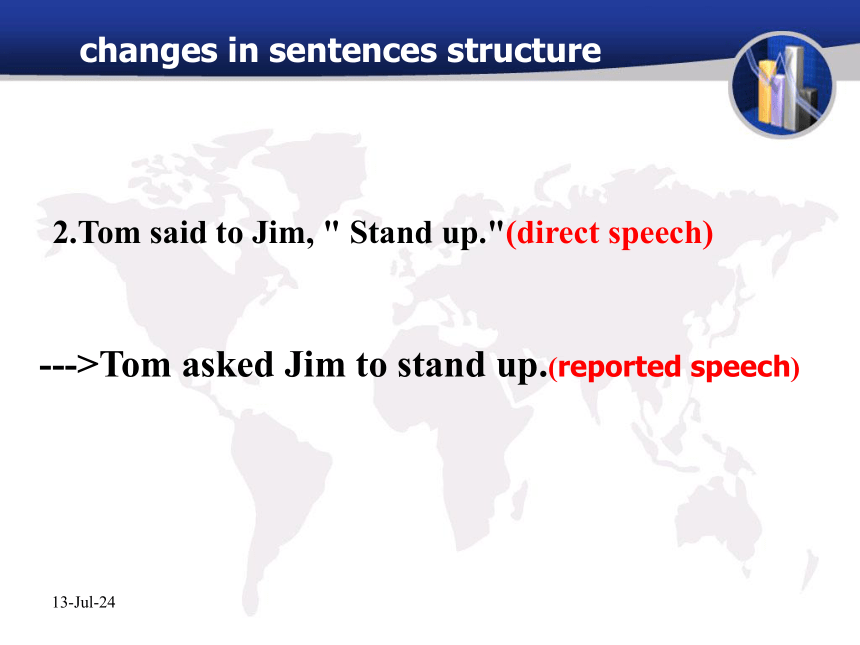

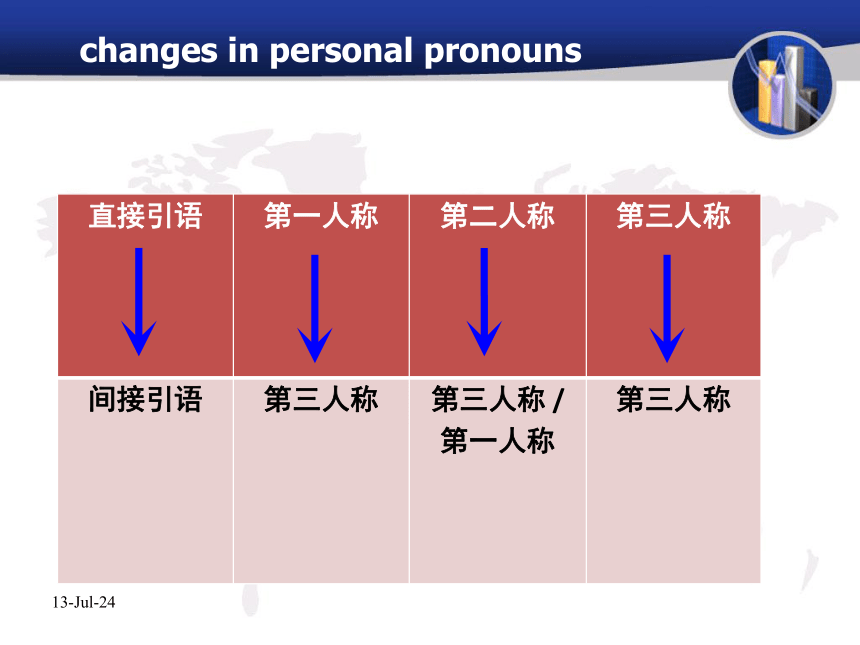
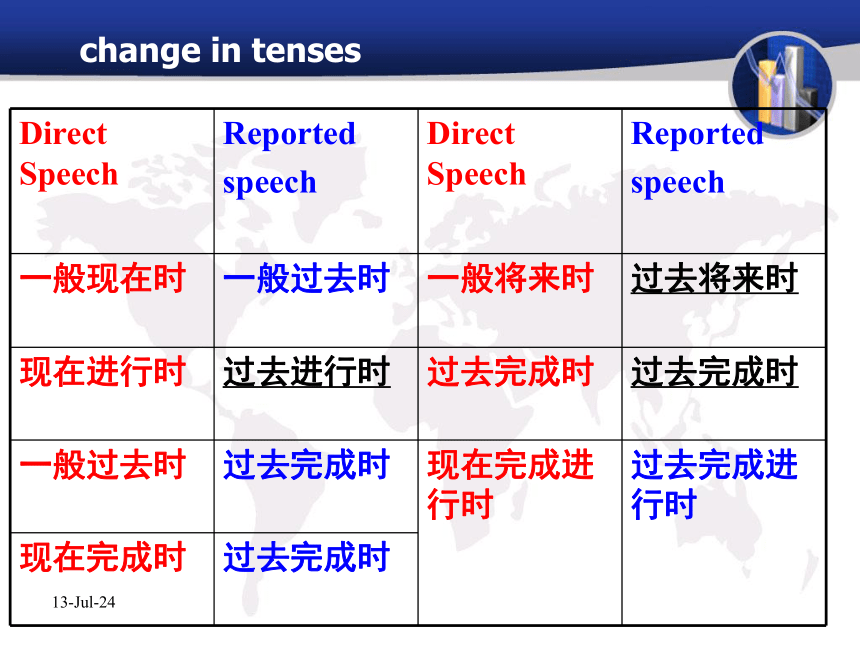
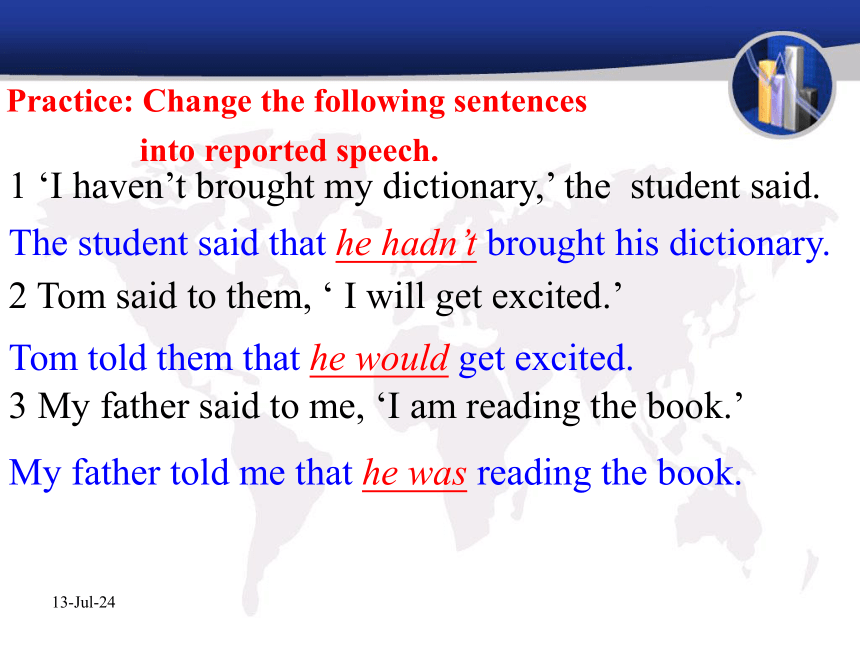

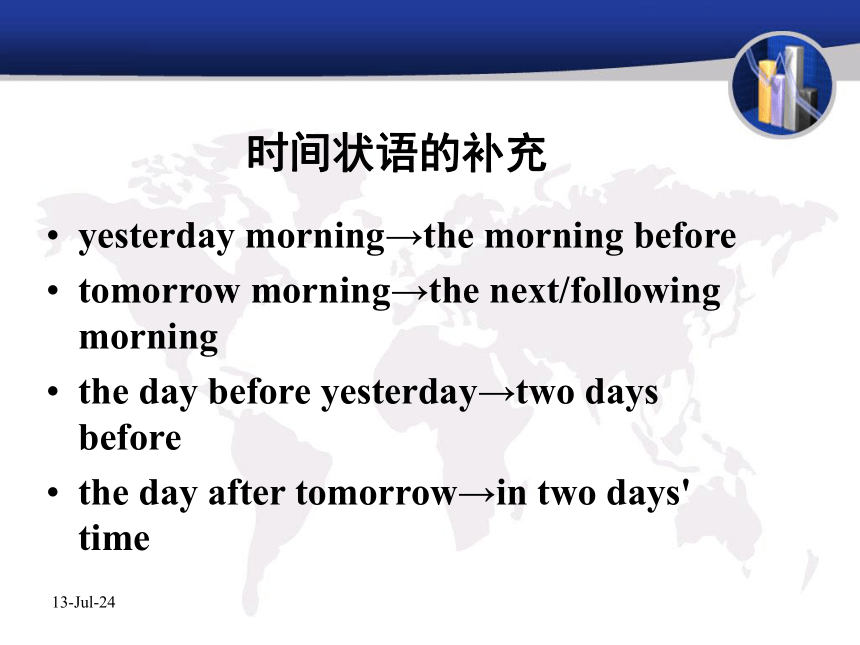
文档简介
课件26张PPT。Module 4 Unit 1how to change direct speech into reported speech30-Jul-19what we will learn1.Tom said, " I watched a wonderful basketball game
yesterday."(direct speech)--->Tom said that he had watched a wonderful basketball the day before.(reported speech)30-Jul-19changes in sentences structure 2.Tom said to Jim, " Stand up."(direct speech)--->Tom asked Jim to stand up.(reported speech)30-Jul-19changes in sentences structure 2.Tom asked Jim, " Do you like to watch ads on TV ?"(direct speech)--->Tom asked Jim whether he liked to watch ads on TV.(reported speech)30-Jul-19changes in sentences structure 30-Jul-19changes in personal pronouns change in tenses30-Jul-19Practice: Change the following sentences into reported speech. 1 ‘I haven’t brought my dictionary,’ the student said.
2 Tom said to them, ‘ I will get excited.’
3 My father said to me, ‘I am reading the book.’
The student said that he hadn’t brought his dictionary.
Tom told them that he would get excited.My father told me that he was reading the book.30-Jul-1930-Jul-19change in adverbial phrases时间状语的补充yesterday morning→the morning before
tomorrow morning→the next/following morning
the day before yesterday→two days before
the day after tomorrow→in two days' time30-Jul-19other changes30-Jul-19Practice: Change the following sentences into reported speech. 1 ‘I will come and see you again this evening, Tom.’ he said.
2 ‘I will come here again today,’ she said.
3 The doctor said to the patient, ‘You will have to wait till 3 pm tomorrow.’
He told Tom that he would go and see him again
that evening.
She said that she’d go there again that day.
The1 doctor told the patient that he would have to
wait till 3 pm the next day.
30-Jul-19Ex: Page 9Possible answers:
(1) was (2) wouldn’t (3) had read
(4)that (5)would (6) had bought
(7) that (8) would (9) those
(10) Her (11) was
(12) was going to read30-Jul-19practice retelling what others said
30-Jul-19各种句型的变化statements (陈述句)questions(疑问句)imperative sentences (祈使句)exclamatory sentences (感叹句)30-Jul-19Statements: *We use noun clauses introduced by that to report statements.
She said, ‘Ads are an important part of our lives.’
‘There are two main types of ads,’ the writer said to us.
*More reporting words:
‘PSAs are often placed for free,’ the writer said.
The writer explained that PSAs are often placed for free.advise agree explain insist promise remind suggest warnShe said that ads are an important part of our lives.The writer told us that there are two main types of ads.30-Jul-19Questions:*We use noun clauses introduced by whether/if to report yes/no-questions.
‘Are all ads playing tricks on us?’I asked her.
*We use noun clauses introduced by wh-words to report wh-questions.
I asked her, ‘How can that be true?’
“Where did you find the ads for jobs abroad?’Bill asked.
I asked her whether/if all ads were playing tricks on us. I asked her how that could be true.Bill asked where I had found the ads for jobs abroad.30-Jul-19Practice: Change the following sentences into reported speech.1 My mother asked me, ‘Do you want to go to the Great Wall with me?’
2 The teacher asked the boy, ‘How many pages have you read today?’
3 I asked Li Ying, ‘ Where and when were you born?’
My mother asked me whether I wanted to go to the
Great Wall with her.
The teacher asked the boy how many pages he had
read that day.
I asked Li Ying where and when he was born.
30-Jul-19Imperative sentences: *To report imperative sentences, we use the structure: reporting verb+object+(not)+to-infinitive.
‘Don’t worry,Mickey,’ Jen said.
Jen asked Mickey not to worry.
*other verbs can be used in this structure
‘Don’t believe every ad you read,’ Lily said to me.
Lily advised me not to believe every ad I read.reporting verbobject(not)to-infinitiveadvise encourage invite remind warn30-Jul-19Practice: Change the following sentences into direct speech. 1 The teacher reminded me not to forget to learn the dialogue by heart.
2 My brother ordered me to go there at once.
3 My father warned us not to throw the waste paper everywhere.
The teacher said to me, ‘Don’t forget to learn the
dialogue by heart.’My brother said, ‘ Come here at once.’ My father said to us, ‘Don’t throw the waste paper
everywhere.’
30-Jul-19He said, "how sad I am !"He said how sad he was
He said that he was sad30-Jul-19间接引语中动词时态不变的若干情况1. 如果主句中的谓语动词是一般现在时或一般将来时
e.g. He says, "I live in London."He says that he lives in London.30-Jul-19He said that when he saw her she was
living in London.30-Jul-19He said that he was born in 199330-Jul-19I asked her, ‘How can that be true?’
I asked her how that could be true.30-Jul-19Ex. Page 11A:
2 asked in what way it was different from other English learning software.
3 asked how it could help him remember English words.
4 Asked whether/if it taught listening and speaking.
5 asked what the designer would do if she was not satisfied with the software.
6 asked if it was user-friendly.30-Jul-19Ex. Page 11B:
2 advises us to use interesting and attractive photos.
3 advises us to use colour to attract people’s attention.
4 advises us to use eye-catching headings to attract people’s attention.
5 advises us to make the text short and easy to read.
6 advises us to study some good advertisements on the Internet for ideas.30-Jul-19
yesterday."(direct speech)--->Tom said that he had watched a wonderful basketball the day before.(reported speech)30-Jul-19changes in sentences structure 2.Tom said to Jim, " Stand up."(direct speech)--->Tom asked Jim to stand up.(reported speech)30-Jul-19changes in sentences structure 2.Tom asked Jim, " Do you like to watch ads on TV ?"(direct speech)--->Tom asked Jim whether he liked to watch ads on TV.(reported speech)30-Jul-19changes in sentences structure 30-Jul-19changes in personal pronouns change in tenses30-Jul-19Practice: Change the following sentences into reported speech. 1 ‘I haven’t brought my dictionary,’ the student said.
2 Tom said to them, ‘ I will get excited.’
3 My father said to me, ‘I am reading the book.’
The student said that he hadn’t brought his dictionary.
Tom told them that he would get excited.My father told me that he was reading the book.30-Jul-1930-Jul-19change in adverbial phrases时间状语的补充yesterday morning→the morning before
tomorrow morning→the next/following morning
the day before yesterday→two days before
the day after tomorrow→in two days' time30-Jul-19other changes30-Jul-19Practice: Change the following sentences into reported speech. 1 ‘I will come and see you again this evening, Tom.’ he said.
2 ‘I will come here again today,’ she said.
3 The doctor said to the patient, ‘You will have to wait till 3 pm tomorrow.’
He told Tom that he would go and see him again
that evening.
She said that she’d go there again that day.
The1 doctor told the patient that he would have to
wait till 3 pm the next day.
30-Jul-19Ex: Page 9Possible answers:
(1) was (2) wouldn’t (3) had read
(4)that (5)would (6) had bought
(7) that (8) would (9) those
(10) Her (11) was
(12) was going to read30-Jul-19practice retelling what others said
30-Jul-19各种句型的变化statements (陈述句)questions(疑问句)imperative sentences (祈使句)exclamatory sentences (感叹句)30-Jul-19Statements: *We use noun clauses introduced by that to report statements.
She said, ‘Ads are an important part of our lives.’
‘There are two main types of ads,’ the writer said to us.
*More reporting words:
‘PSAs are often placed for free,’ the writer said.
The writer explained that PSAs are often placed for free.advise agree explain insist promise remind suggest warnShe said that ads are an important part of our lives.The writer told us that there are two main types of ads.30-Jul-19Questions:*We use noun clauses introduced by whether/if to report yes/no-questions.
‘Are all ads playing tricks on us?’I asked her.
*We use noun clauses introduced by wh-words to report wh-questions.
I asked her, ‘How can that be true?’
“Where did you find the ads for jobs abroad?’Bill asked.
I asked her whether/if all ads were playing tricks on us. I asked her how that could be true.Bill asked where I had found the ads for jobs abroad.30-Jul-19Practice: Change the following sentences into reported speech.1 My mother asked me, ‘Do you want to go to the Great Wall with me?’
2 The teacher asked the boy, ‘How many pages have you read today?’
3 I asked Li Ying, ‘ Where and when were you born?’
My mother asked me whether I wanted to go to the
Great Wall with her.
The teacher asked the boy how many pages he had
read that day.
I asked Li Ying where and when he was born.
30-Jul-19Imperative sentences: *To report imperative sentences, we use the structure: reporting verb+object+(not)+to-infinitive.
‘Don’t worry,Mickey,’ Jen said.
Jen asked Mickey not to worry.
*other verbs can be used in this structure
‘Don’t believe every ad you read,’ Lily said to me.
Lily advised me not to believe every ad I read.reporting verbobject(not)to-infinitiveadvise encourage invite remind warn30-Jul-19Practice: Change the following sentences into direct speech. 1 The teacher reminded me not to forget to learn the dialogue by heart.
2 My brother ordered me to go there at once.
3 My father warned us not to throw the waste paper everywhere.
The teacher said to me, ‘Don’t forget to learn the
dialogue by heart.’My brother said, ‘ Come here at once.’ My father said to us, ‘Don’t throw the waste paper
everywhere.’
30-Jul-19He said, "how sad I am !"He said how sad he was
He said that he was sad30-Jul-19间接引语中动词时态不变的若干情况1. 如果主句中的谓语动词是一般现在时或一般将来时
e.g. He says, "I live in London."He says that he lives in London.30-Jul-19He said that when he saw her she was
living in London.30-Jul-19He said that he was born in 199330-Jul-19I asked her, ‘How can that be true?’
I asked her how that could be true.30-Jul-19Ex. Page 11A:
2 asked in what way it was different from other English learning software.
3 asked how it could help him remember English words.
4 Asked whether/if it taught listening and speaking.
5 asked what the designer would do if she was not satisfied with the software.
6 asked if it was user-friendly.30-Jul-19Ex. Page 11B:
2 advises us to use interesting and attractive photos.
3 advises us to use colour to attract people’s attention.
4 advises us to use eye-catching headings to attract people’s attention.
5 advises us to make the text short and easy to read.
6 advises us to study some good advertisements on the Internet for ideas.30-Jul-19
